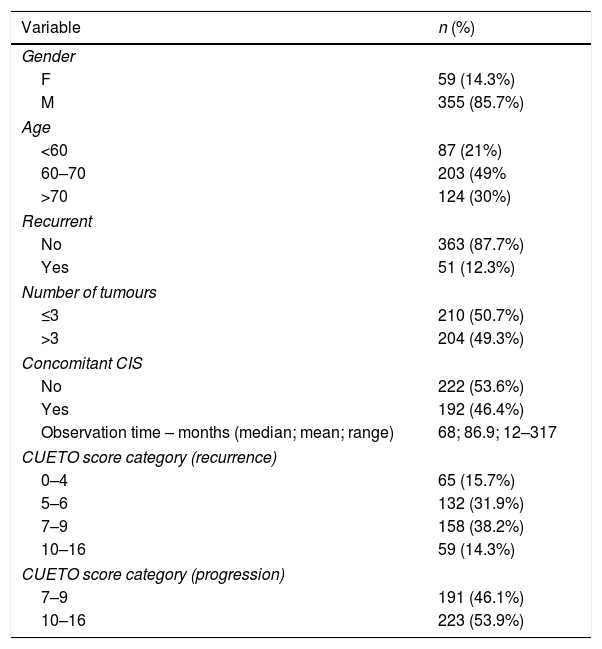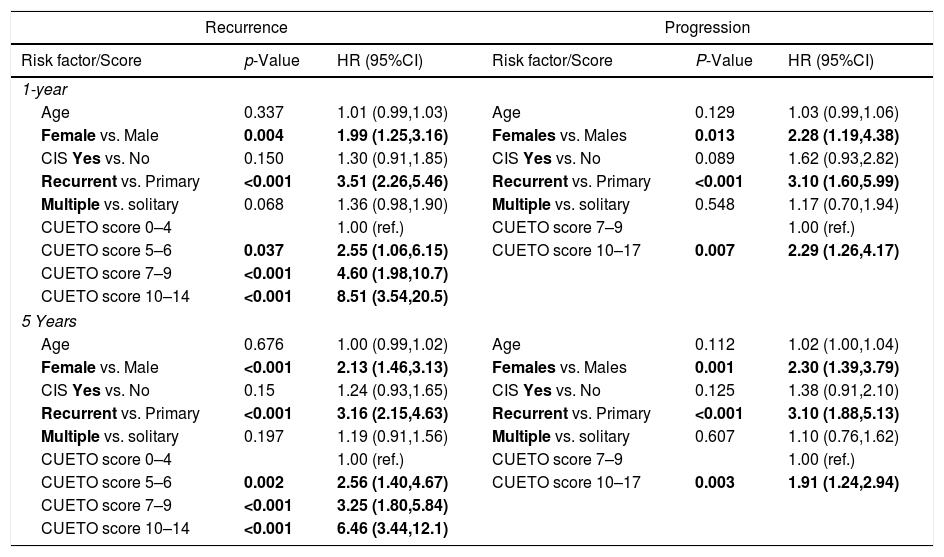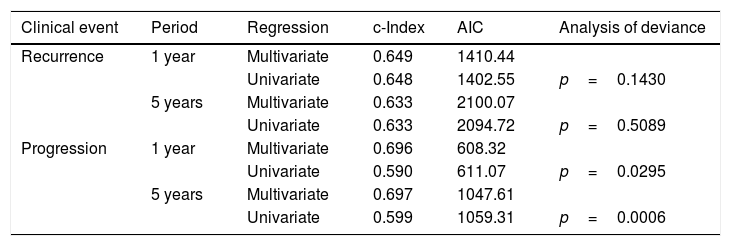Various studies tried to validate Club Urológico Español de Tratamiento Oncológico (CUETO) tables, yet, none of this papers focused on the high and very high risk bladder cancers. The aim of the study was to externally validate the CUETO model for predicting disease recurrence and progression in group of T1G3 tumours treated with BCG immunotherapy.
Patients or materials and methodsData from 414 patients with primary T1G3 bladder cancer were analyzed. To evaluate the model discrimination, Cox proportional hazard regression models were created and concordance indexes were calculated.
ResultsThe median follow-up was 68 months. The recurrence was observed in 212 (51.2%) and 64 patients (15.5%) experienced the recurrence more than once during the study follow-up. Progression of the cancer was observed in 106 patients (25.6%). Radical cystectomy was performed in 115 patients (27.8%) and there were 64 (15.5%) cancer specific deaths. For recurrence and progression probability, the concordance index of the CUETO models was 0.633 and 0.697 respectively. CUETO tables underestimated significantly the risk of recurrence and marginally the risk of progression in the first year of observation. For 5 years of observation, the trend for the recurrence was much less clear. On the contrary, there was slight overestimation in the risk of progression. The study is limited by retrospective nature.
ConclusionsIt was shown that the CUETO risk tables exhibit a fair discrimination for both disease recurrence and progression in T1G3 patients treated with BCG. CUETO scoring model underestimates the risk of tumour recurrence, but predicts well risk of progression.
Existen varios estudios con el objetivo de validar las tablas del Club Urológico Español de Tratamiento Oncológico (CUETO). Sin embargo, ninguno de estos estudios se ha centrado en el cáncer de vejiga de alto y muy alto riesgo. El objetivo del presente estudio fue validar externamente el modelo CUETO para predecir la recidiva y la progresión de la enfermedad en el grupo de tumores T1G3 tratados con bacilo Calmette-Guérin (BCG).
Pacientes o materiales y métodosSe analizaron los datos de 414 pacientes con cáncer de vejiga T1G3 primario. Para evaluar la discriminación del modelo se usaron modelos de riesgos proporcionales de Cox y se calcularon los índices de concordancia.
ResultadosLa mediana de seguimiento fue de 68 meses. Se observó recidiva en 212 (51,2%) y 64 pacientes (15,5%) experimentaron más de un episodio de recurrencia durante el periodo de seguimiento. La progresión del cáncer se observó en 106 pacientes (25,6%), 115 pacientes (27,8%) fueron tratados con cistectomía radical, y hubo 64 (15,5%) muertes por tumor. Para la probabilidad de recidiva y progresión, el índice de concordancia de los modelos CUETO fue de 0,633 y 0,697, respectivamente. Las tablas de CUETO subestimaron significativamente el riesgo de recidiva y marginalmente el riesgo de progresión en el primer año de observación. Durante los 5 años de observación, la tendencia de la recidiva fue mucho menos clara. Por el contrario, hubo una ligera sobreestimación en el riesgo de progresión. El estudio está limitado por su naturaleza retrospectiva.
ConclusionesSe demostró que las tablas de riesgo del grupo CUETO logran una discriminación correcta, tanto para la recidiva de la enfermedad como para la progresión, en pacientes con T1G3 tratados con BCG. El modelo de puntuación (CUETO) subestima el riesgo de recidiva del tumor, pero acierta al predecir el riesgo de progresión.











